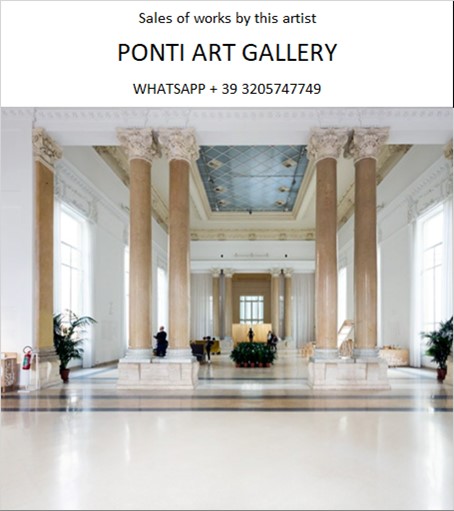Ponti Art Gallery is interested in buying and selling works
of art by this artist.

Joe Jones Biography
Joseph John Jones, known as Joe Jones, was an American painter whose work profoundly reflected the socio-economic realities of his time. Born on July 4, 1909, in St. Louis, Missouri, Jones was the youngest of five children to a Welsh immigrant father who worked as a house painter and a German American mother. His early life was marked by modest means and a brief stint in a Missouri reformatory, which would later influence his perspective as an artist.
Jones's artistic journey began without formal training; he was self-taught, having left school at the age of fifteen to work alongside his father. Despite this, he quickly made a name for himself in the local art scene, winning his first award in 1931. His early works, characterized by their depiction of Midwestern Regionalist themes, particularly wheat fields and wheat farming, garnered attention and acclaim. This recognition led to the formation of the "Joe Jones Club" by ten patrons in St. Louis, who financed his travel to the artists' colony in Provincetown, Massachusetts.
Jones's political activism was as pronounced as his art. He organized art classes for unemployed youngsters and was known for his association with the Communist Party. His political leanings, however, led to a falling out with some of his patrons and a charge of spreading Communist propaganda. This prompted his move to New York City, where he continued to develop his career and was involved with the John Reed Club, an organization of artistically inclined members, many of whom contributed to the New Masses magazine.
In New York, Jones's work evolved, and he began to receive significant commissions, including murals for post offices in the Midwest and the Great Plains as part of the Treasury Section of the Fine Arts, a New Deal program. His murals, such as "Turning a Corner" and "Men and Wheat," depicted the harmony of man, machine, and landscape, yet they also subtly revealed the environmental impact of human activity.
During the 1930s, Jones's art took a more controversial turn with social protest paintings like "We Demand" and "American Justice," which depicted a lynching. These works brought him national prominence and were indicative of his commitment to social realism. However, as social realism fell out of fashion in the 1940s, Jones shifted his focus to landscapes and corporate commissions, working for clients such as Fortune magazine and Standard Oil.
Jones's style underwent another transformation in the late 1940s, moving towards minimalism and non-representational art. He also served as a combat artist for Life Magazine during World War II. Post-war, his art lost its political edge, and he embraced a spare, delicate, and linear style influenced by Japanese art, as well as an Impressionist-inspired landscape style.
Despite his evolving styles, Jones's work remained rooted in the American experience. His painting "American Farm," which depicted the devastating effects of the Great Depression on rural America, is a testament to his ability to capture the essence of a particular historical moment.
Jones's personal life was as tumultuous as the times he lived in. He married Freda Sies, a modern dancer and political activist, in 1930, but the marriage ended in divorce. He later married again and settled in Morristown, New Jersey, where he lived quietly with his family until his untimely death from a heart attack on April 9, 1963.
Throughout his career, Jones's work was featured in numerous exhibitions and is held in the collections of prestigious institutions such as the Cleveland Museum of Art, the Denver Art Museum, the Detroit Institute of Arts, the National Gallery of Art, the Saint Louis Art Museum, the Smithsonian American Art Museum, and the Whitney Museum of American Art. His legacy is preserved through retrospectives and monographs, including "Joe Jones: Radical Painter of the American Scene," published by the Saint Louis Art Museum, ensuring that his contributions to American art and social commentary continue to be recognized and appreciated.
Joe Jones Quotes and Sales of
Works
Ponti Art Gallery selects and deals with paintings by the
artist. Upon request, we provide free estimates and
evaluations, communicate prices, quotations, and current
market values.
If you are interested in BUYING or SELLING works by the
artist, contact us immediately.
If you wish to sell or receive an evaluation of the
works:
Send us a frontal photo of the painting, one of the back,
and one of the signature. Also, indicate the dimensions of
the work. Inform us about the purchase origin of the work
and any kind of available documentation (purchase
receipts, certificates of authenticity, publications). One
of our operators will respond to you on the same day. We
guarantee maximum confidentiality and extreme
professionalism.
If you wish to purchase works by the painter: Contact us
and let us know your request. We will inform you about the
available works. We also offer the possibility to
subscribe to our NEWSLETTER, through which you will be
informed at the beginning of each month about the latest
acquisitions of the art gallery.
You can send us pictures of the work:
